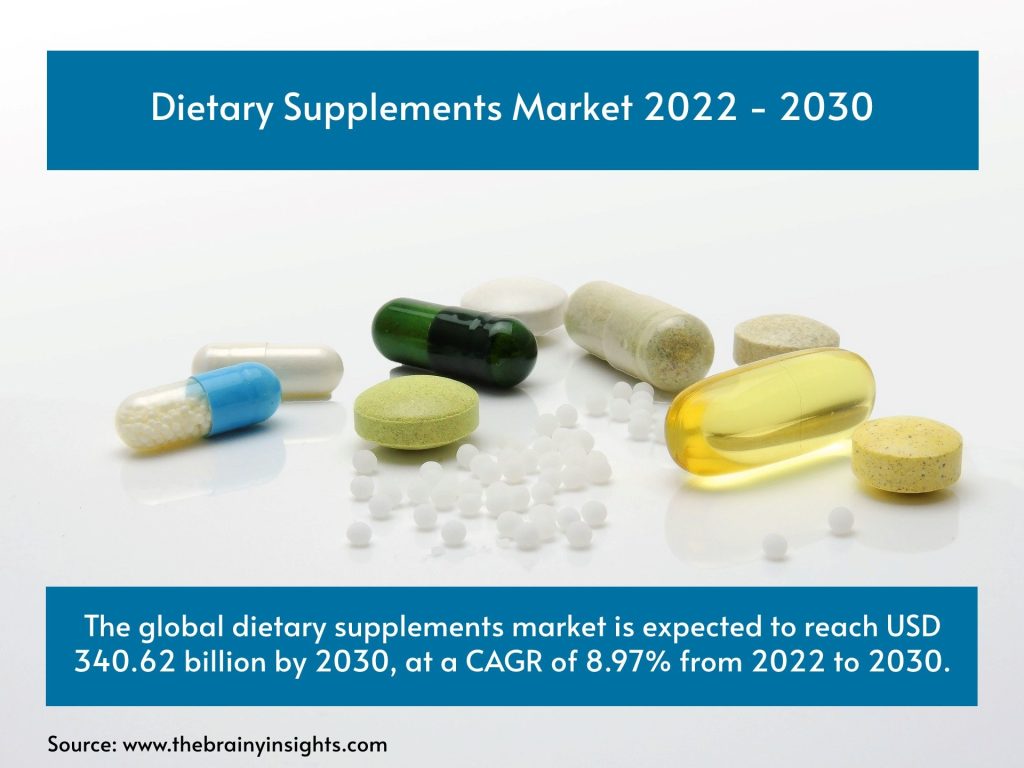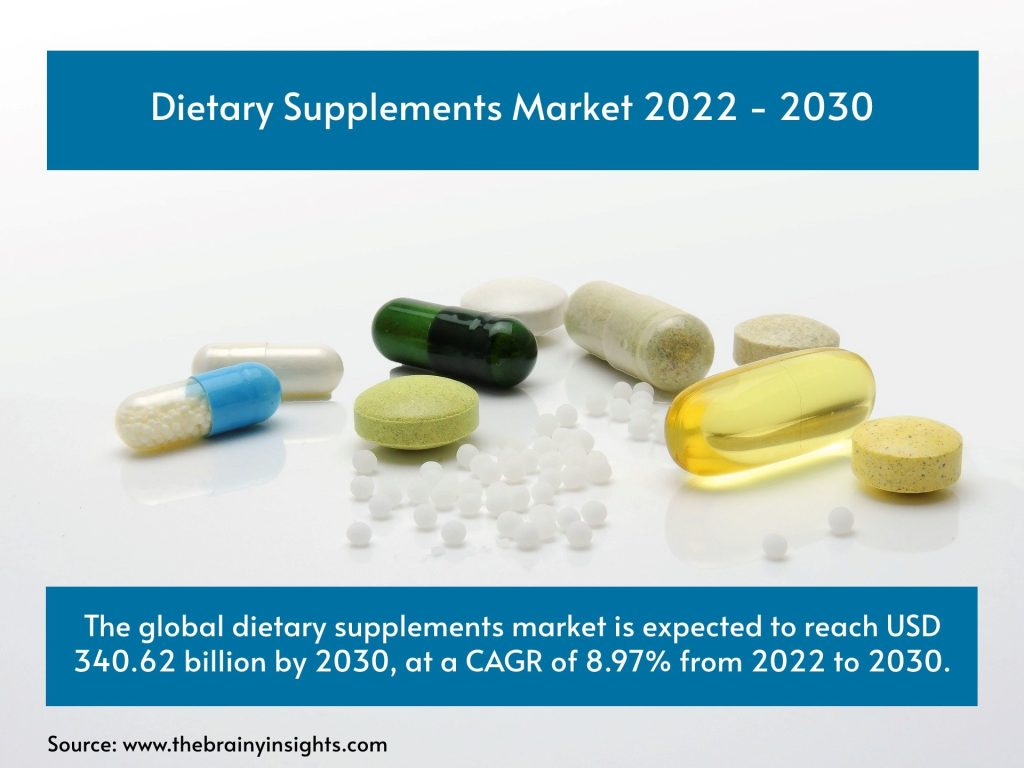Dietary Supplements Market Forges Ahead with New Launches and Expansions

Dietary supplements market growth would be driven by the rising consumer awareness about general well-being and preventive healthcare. The increase in lifestyle diseases and other chronic conditions also drives the demand for dietary supplements. The increasing disposable income of individuals also aids market growth. The growing trend of personal nutrition will also propel the market’s growth. Product innovations for applying dietary supplements in personal care, weight management, preventive healthcare, and general well-being will contribute to the development of the market.
The Dietary Supplements Market
As per the report published by The Brainy Insights, the global dietary supplements market is expected to grow from USD 157.22 billion in 2021 to USD 340.62 billion by 2030, at a CAGR of 8.97% during the forecast period 2022-2030. The North America region emerged as the largest market for the global dietary supplements market, with a 40.34% share of the market revenue in 2021. North America currently dominates the dietary supplements market due to increasing lifestyle and chronic diseases/conditions, encouraging people towards preventive healthcare such as dietary supplements. The population’s high disposable income is driving the region’s dietary supplements market.
The growing geriatric population is also propelling the intake of dietary supplements that are high in nutritional value and low in caloric content. The rising consumption of vitamins, minerals, and other dietary supplements by working individuals, athletes, fitness enthusiasts, and regular people are driving the market.
The Asia Pacific is expected to grow the fastest during the forecast period, given the growing western influence on consuming dietary supplements in the region. The increasing disposable income drives personalized nutrition demand in markets like China, India, South Korea, and Vietnam. The thriving pharmaceutical sector and large consumer base are attracting major market players to the region. Market players are adopting innovative competitive strategies to capture the market by increasing research and development and thereby contributing to the growth of the regional dietary supplements market.
Leading companies in the industry include Abbott, ADM, Amway Corporation, Bayer AG, Glanbia PLC, GlaxoSmithKline PLC, Herbalife International of America Inc., Nestle SA, Nu Skin Enterprises Inc., and Pfizer Inc., among others which are offering more significant opportunities and are continuously focused on new product developments and venture capital investments to obtain market share.
Ingredient type segmentation
The ingredient type segment is divided into vitamins, minerals, enzymes, probiotics, fibers & specialty carbohydrates, botanicals, proteins & amino acids, omega fatty acids, and others. The vitamin segment dominated the market with a revenue share of around 37% in 2021. The application segment is divided into energy & weight management, bone & joint health, immunity, diabetes, lungs, skin/hair, mental health, menopause, prenatal health, anti-aging, insomnia, sexual health, anti-cancer, cardiac health, gastrointestinal health, general health, and others. Over the forecast period, the gastrointestinal health segment is expected to grow the most and acquire the highest market share during the forecast period. It will grow at a CAGR of 12.29%. The form type segment is divided into tablets, soft gels, gummies, liquids, powders, capsules, and others.
The tablet segment dominated the market with a revenue share of around 44% in 2021. The distribution channel segment is divided into supermarkets/hypermarkets, pharmacies, specialty stores, online, and others. The pharmacies segment dominated the market with a revenue share of around 45% in 2021. The growing presence of pharmacies in developing countries will contribute to the segment’s growth. The well-established network of pharmacies in developed countries makes them a popular choice for buying dietary supplements, given their convenience. The presence of pharmacists who can assist customers by offering the proper over-the-counter medication according to their needs is an added advantage driving the development of the segment. The availability of all brands and their products in one place is another significant benefit they offer.
According to the WHO report “Impact of Covid-19 Pandemic on Livelihoods and Food Security”, poverty has increased. Around 30 million of the middle-class population slid below the poverty line in 2020. The loss of income has reduced food consumption or the nutritional value, as food of inferior quality has to be consumed. Children of those who lost their livelihoods are suffering from malnutrition, wasting, and stunting. On the other side of the coin, the closure of the school and the sports-related activities conducted in schools have increased the number of obese children. The worst hit countries are in the African continent and the South Asian region of the Asian continent, including India. Dietary supplements can be employed to mitigate the problem of undernutrition and overnutrition. They aid in weight management; they promote digestion and improve immunity. These can fulfill the nutritional requirements of the body as well as help fight diseases and illnesses.
Regional Segmentation Analysis
The market is analyzed based on five regions: North America, Europe, Asia Pacific, South America, and the Middle East and Africa. The Asia Pacific is expected to be the largest market during the forecast period. The dietary supplements market in the Asia Pacific has been expanding rapidly. China, India, South Korea, Japan, and Vietnam dominate the dietary supplements market in the Asia Pacific. Japan’s aging population is inclined towards consuming dietary supplements due to their natural and compact nature in the form of pills, capsules, and tablets, which are easy to in-take. The cases of obesity and malnutrition are increasing in the south Asian region, with the numbers of malnutrition rising because of COVID-induced lockdowns. The cases of malnutrition are a combination of numbers of children with conditions like wasting and stunting. The immunity of individuals has also reduced globally. These factors have increased the need for supplements like probiotics, immunity boosters, and other dietary supplements which promote heart, lung, & gut health, improve digestion, increase immunity and fight off diseases/illnesses.
About the report:
The global dietary supplements market is analyzed based on value (USD Billion). All the segments have been analyzed on a worldwide, regional, and country basis. The study includes the analysis of more than 30 countries for each part. The report offers an in-depth analysis of driving factors, opportunities, restraints, and challenges for gaining critical insight into the market. The study includes Porter’s five forces model, attractiveness analysis, raw material analysis, supply, and demand analysis, competitor position grid analysis, distribution, and marketing channels analysis.

